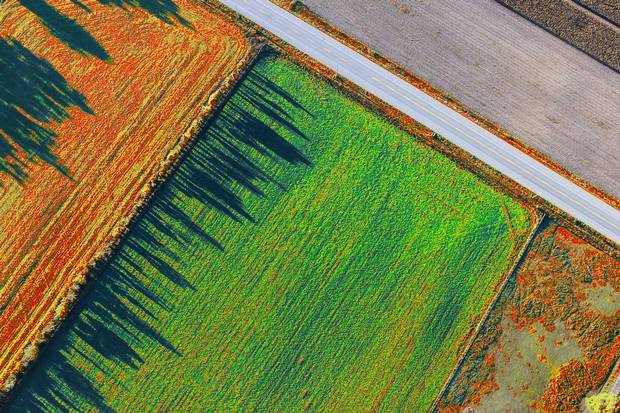
Anomaly graphics for potato field highlighting different problem areas
Courtesy Resson
Satellite imaging. Drones. High-tech cameras and sensors. Powered by technology straight out of a spy novel, Fredericton-based Resson Inc. is combining massive data sets, cloud-based processing and leading-edge machine learning to help farmers and food companies maximize profits and nip field problems in the bud. By analyzing detailed pictures of crops—from table grapes to potatoes—the company's software spits out specific information farmers can use to determine where pests are attacking, where more or less water is needed, and where and how much to fertilize.
Resson was started in 2013 by two University of New Brunswick students, and in 2016, it raised $11 million (U.S.) from agri-food giant Monsanto (its lead investor) and Maritime potato juggernaut McCain Foods. Based on input from McCain's largest growers, and with constant tweaking of its online dashboard, the company plans to make its software commercially available next year.
When the product is paired with a new generation of data-sensitive tractors (many of which are now self-driving), Giri Baleri, Resson's vice-president of product marketing, says large growers will have unprecedented control over complex operations. "They can play around with the data, look at the images, look at the analytics," he says. "They can compare a field in time-lapse, or compare one field over another." To access Resson's platform, farmers pay a per-acre, per-growing-season subscription fee; the company aims to save farmers $3 for every dollar they spend on the technology.
Letting farmers decide what information they need and how to use it is integral to Resson's value proposition, says Baleri. "Companies tend to forget that in ag-tech, the key word is 'ag,' not 'tech,'" he says. "These growers have been doing this for generations. They might not be technology-savvy, but they understand the ground truth and ground reality better than technology ever could."
After years of focusing on the Maritimes, Resson recently expanded to seven regions in three countries, including New Zealand, and employs 40 people between Fredericton and a business development branch in San Jose. "California is a hub of all the high-value crops," says Baleri. "That gives us direct access to growers to expand the partnership beyond the McCains of the world. We're trying to be a global company."